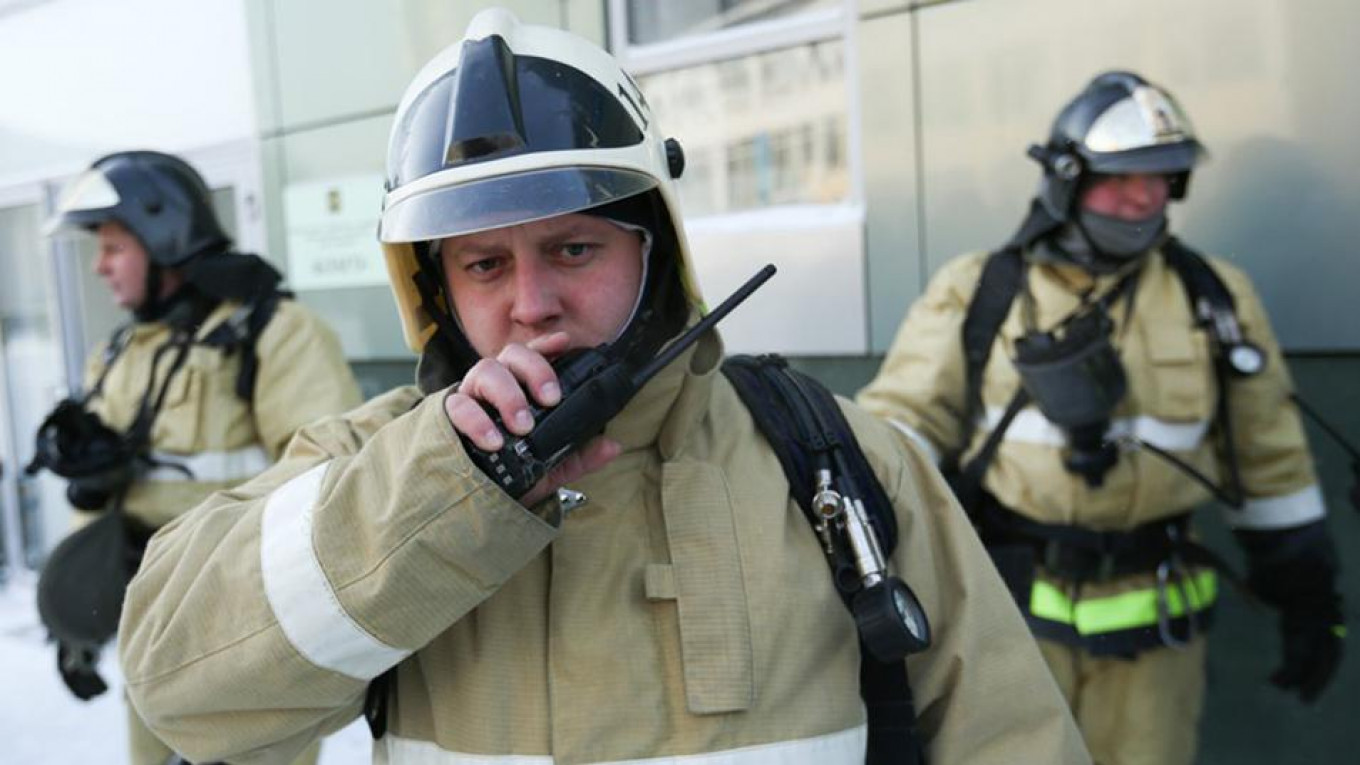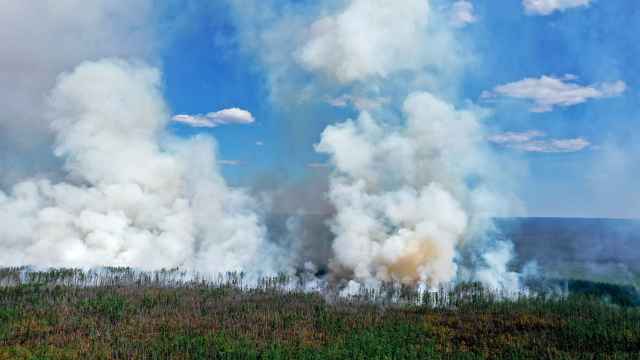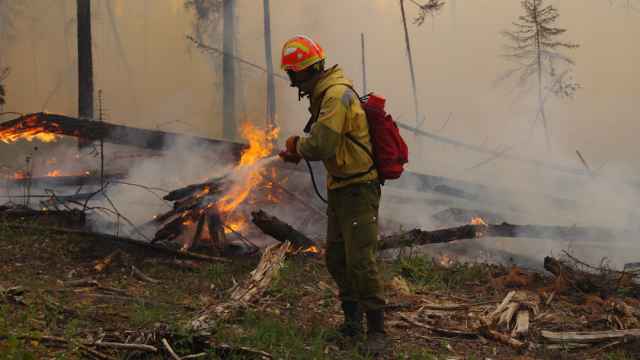Watching a movie with her family in the cinema complex in Kemerovo’s Winter Cherry mall, Anna Zarechneva only found out that a fire was spreading through the building when a woman opened the theater doors, urging those in the auditorium to flee.
“The woman burst in yelling, ‘Fire! Fire!’” Zarechneva recounted to the RBC business portal. “We started to run out, but no one even turned on the lights so we could see where we were going.”
The absence of a fire alarm was just one in a litany of failures in fire safety procedures during the tragedy in the Siberian coal-mining town that claimed 64 lives, many of them children. Sprinklers failed to go off throughout the four-story building, security guards neglected to notify visitors and a number of exits were blocked.
In the aftermath, investigators found that the mall’s management violated a series of regulations. But what may come as a surprise is that the mall had not been inspected prior to 2016 because of an entirely legal pass it was granted on safety inspections.
In July 2015, President Vladimir Putin signed into law a moratorium on inspections of small businesses, which came into effect at the start of 2016 and is scheduled to run through the end of this year. Businesses with turnover of $13.9 million per year or less, no more than 100 employees and a clean safety record in the previous three years would be exempt from further inspections.
As a result, hundreds of shopping centers across Russia, including the Kemerovo mall, bypassed inspections, The Bell outlet reports. According to one expert speaking to the Kommersant business daily, the result is that “malls like Winter Cherry stand across this country like torches, that just need a match brought up to them.”
According to Anastasia Khudyakova of HEADS Consulting, a Moscow-based legal consulting company, the intention behind the moratorium was to ensure that small businesses still developing are not subjected to countless bureaucratic checks that, she said, might hinder their growth. As Putin put it in 2016, the government’s meddling in business leads to its “direct destruction.”
Khudyakova doubted that more inspections could have prevented the tragedy.
“Official checks are planned months in advance,” she explained. “So businesses scramble to prep for the officials, and then everything goes back to how it was before once the checks are done.”
Or, she said, because of widespread corruption, business owners simply bypass inspections for kickbacks.
“The only inspections that can work are those that are unplanned,” Khudyakova said. “And those can only be done by the regional prosecutor if they receive an official complaint.”
Russia’s mega malls — which, like Winter Cherry, often span four stories or taller, and house cinemas, children’s entertainment areas, even petting zoos — do not seem to fit the definition of a small business.
For that, though, there is a workaround. “Our malls are often run by smaller management companies, which have a small fixed budget,” explained Oleg Voytsekhovsky, the director of Russia’s Council of Shopping Centers. “So even our biggest malls are often considered to be small businesses.”
Voytsekhovsky estimates that there are more than 1,000 malls nationwide. Despite the recent tragedy and the lack of thorough official checks in recent years, he does not believe parents should fear bringing their children to their local shopping center.
“I look at this from a statistical perspective,” Voytsekhovsky said. “This is the first such tragedy in many, many years. Do we stop flying planes just because there was a single plane crash?”
Not all experts believe the moratorium is at fault.
“I don’t think that we need more government oversight,” Marina Bludyan, the co-chairman of the ruling United Russia party’s Platform for Support of Entrepreneurship Initiative, told The Moscow Times. “What we need is quality. You can have all the government oversight you want in the world, like we do, and yet, look at the result.”
In a phone interview, Bludyan brushed off the break in inspections as the reason the Winter Cherry mall’s management was not caught neglecting its fire safety procedures. She said that the regional prosecutor’s office had been satisfied with prior checks, and she doubted that so much could have gone so far south just over the next few years.
“Clearly,” Bludyan said, “something fell through the cracks.”
Since the tragedy, the General Prosecutor’s Office announced a nationwide inspection of malls, specifically those with “entertainment centers” and movie theaters. They are expected to wrap up by the middle of April.
Last week, before the fire safety inspections were completed, another fire erupted in a Moscow children’s mall last week, killing one.
The sweeping inspections followed declarations of mall boycotts on social media until they were completed. Even after the prosecutor’s announcement, several large shopping malls in Moscow and the Moscow region reported a 10-20 percent drop off in visitors.
Others, like Bludyan, have proposed additional solutions.
“What we need is for small business owners to be forced to purchase insurance,” she told The Moscow Times. “You can’t bribe an insurance agent into letting you not strictly follow safety procedures, because the insurance company will be paying for the damage and compensation fees if something goes wrong.”
Beyond formal regulation, Bludyan believes business owners need to simply start taking responsibility.
“We need to turn our brains on,” Bludyan explained. “We need to close our eyes and hear those voices that said, ‘Mom, I am suffocating and no one is helping.’”
A Message from The Moscow Times:
Dear readers,
We are facing unprecedented challenges. Russia's Prosecutor General's Office has designated The Moscow Times as an "undesirable" organization, criminalizing our work and putting our staff at risk of prosecution. This follows our earlier unjust labeling as a "foreign agent."
These actions are direct attempts to silence independent journalism in Russia. The authorities claim our work "discredits the decisions of the Russian leadership." We see things differently: we strive to provide accurate, unbiased reporting on Russia.
We, the journalists of The Moscow Times, refuse to be silenced. But to continue our work, we need your help.
Your support, no matter how small, makes a world of difference. If you can, please support us monthly starting from just $2. It's quick to set up, and every contribution makes a significant impact.
By supporting The Moscow Times, you're defending open, independent journalism in the face of repression. Thank you for standing with us.
Remind me later.







